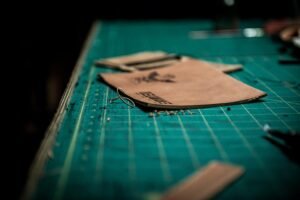Ensuring Compliance with Legal Regulations in the Alligator Leather Trade
In the world of fashion, alligator leather continues to be a coveted material known for its luxurious texture and unique aesthetic. However, alongside the demand for alligator leather, there is a growing need to ensure that legal regulations are adhered to in the trade industry. This article explores the different legal regulations surrounding the alligator leather trade, offering insights into how businesses can navigate this complex landscape and ensure compliance with these important regulations. From understanding international trade laws to sourcing alligator skins from responsible suppliers, this article provides a comprehensive overview of the steps businesses can take to ensure ethical practices within the alligator leather trade.
Overview of the Alligator Leather Trade
Importance of the alligator leather industry
The alligator leather industry holds significant importance both economically and culturally. Alligator leather products are highly sought after for their durability, luxury, and unique texture. The industry provides job opportunities for individuals involved in sourcing, harvesting, processing, and manufacturing alligator leather products. Additionally, it contributes to local and national economies through revenue generated from exports.
Demand for and use of alligator leather
Alligator leather is in high demand across various luxury industries, including fashion, accessories, and home decor. Its distinct pattern and texture make it a desirable choice for products such as handbags, wallets, belts, shoes, and even furniture. The demand is driven by consumers who appreciate the exclusivity and premium quality associated with alligator leather goods.
Current state of the alligator leather trade
The alligator leather trade has undergone significant changes in recent years. While the demand for alligator leather products remains strong, there has been a shift towards a more sustainable and ethical approach in the industry. The trade is now subject to various legal regulations and compliance measures to ensure the protection of alligator populations and their habitats.
Value of the alligator skin market
The alligator skin market holds considerable value globally. According to industry reports, the market is estimated to be worth several hundred million dollars annually. The value of alligator skins is determined by factors such as size, quality, and rarity. Premium skins, especially those from larger alligators with flawless patterns, can command high prices in the market.
Understanding Legal Regulations in the Alligator Leather trade
Local, national, and international regulations
The alligator leather trade is subject to a complex set of legal regulations at different levels. These regulations can vary from country to country, making it essential for businesses to familiarize themselves with the specific rules and requirements in their operating regions. At the local level, permits may be required for activities like alligator harvesting and processing. Nationally, wildlife laws may be in place to protect alligator populations. Internationally, conventions and agreements govern the trade, ensuring its sustainability and ethicality.
CITES (Convention on International Trade in Endangered Species of Wild Fauna and Flora)
CITES is an international treaty that regulates the trade of endangered species and their by-products, including alligator leather. Alligator species are listed under CITES, and their trade is subject to strict controls to prevent illegal harvesting, trafficking, and unsustainable practices. CITES issues permits to ensure the legality and traceability of alligator leather products in international trade.
Endangered Species Act
In the United States, the Endangered Species Act (ESA) plays a crucial role in the regulation of alligator leather trade. The law prohibits the trade of endangered or threatened species and their by-products, providing protection for alligator populations. Compliance with the ESA is necessary for businesses involved in alligator leather sourcing, processing, and trade within the United States or its territories.
Regulations related to sourcing and harvesting
Regulations related to alligator leather trade often extend to the sourcing and harvesting of alligator skins. These regulations aim to ensure responsible and sustainable practices. For example, they may govern the size of alligators that can be legally harvested or require certain techniques to minimize harm during skinning. Compliance with these regulations is crucial to maintaining the integrity and legality of the alligator leather trade.
Ethical considerations in the trade
In addition to legal requirements, ethical considerations play a significant role in the alligator leather trade. Businesses should strive to ensure that alligator sourcing and farming operations adhere to humane practices, minimizing stress and suffering for the animals involved. By promoting welfare standards and transparency, the industry can enhance its reputation and strengthen consumer trust.

This image is property of images.unsplash.com.
Legal framework and enforcement measures
To enforce compliance and prevent illegal practices in the alligator leather trade, governments and regulatory bodies have established a legal framework. This framework includes strict penalties for noncompliance, inspections of alligator farms and processing facilities, and surveillance to detect and deter illegal activities. By implementing robust enforcement measures, authorities aim to safeguard alligator populations and maintain the integrity of the trade.
Compliance Challenges in the Alligator Leather Trade
Illegal poaching and trafficking of alligators
One of the primary challenges in the alligator leather trade is the presence of illegal poaching and trafficking networks. These networks engage in the illegal harvesting of alligators, often endangering the survival of certain species. The illegal trade undermines conservation efforts and the sustainability of the industry. It is crucial to combat these activities through increased surveillance, law enforcement, and public awareness campaigns.
Identifying legitimate sources of alligator skins
In a vast and global market, identifying legitimate sources of alligator skins can be challenging. The trade heavily relies on the documentation and proper traceability of skins to ensure legal compliance. However, inconsistencies and fraudulent practices can occur, making it important for businesses to establish due diligence procedures and engage with trusted suppliers who can provide transparent sourcing information.
Ensuring compliance throughout the supply chain
The complex nature of the alligator leather supply chain presents compliance challenges. From sourcing to manufacturing and distribution, businesses must ensure that all parties involved adhere to legal and ethical requirements. Implementing robust supply chain management systems, conducting regular inspections, and maintaining clear communication with suppliers can help address these challenges.
Enforcement and monitoring challenges
The enforcement and monitoring of compliance measures in the alligator leather trade can be resource-intensive and challenging. Limited resources, vast geographic areas, and the adaptability of illegal networks pose significant obstacles to effective enforcement. Governments and regulatory agencies must allocate adequate resources, collaborate with international partners, and leverage modern technologies to overcome these challenges.
Certification and traceability issues
Certification and traceability are essential for ensuring the legality and sustainability of the alligator leather trade. However, establishing and maintaining reliable certification systems can be complex. Issues such as certification fraud, lack of consistency, and inadequate record-keeping practices can undermine the effectiveness of certification programs. Strengthening certification processes and promoting transparency can help address these issues.
Best Practices for Compliance in the Alligator Leather Trade
Establishing due diligence procedures
To ensure compliance with legal regulations, businesses in the alligator leather trade should establish robust due diligence procedures. This includes conducting thorough checks on suppliers, verifying the legality of alligator skins and their origins, and keeping detailed records of all transactions and sourcing activities. By implementing due diligence protocols, businesses can mitigate the risks of noncompliance and support sustainable practices.
Implementing robust record-keeping systems
Accurate and comprehensive record-keeping is crucial in demonstrating compliance with legal regulations. Businesses should maintain detailed records of all transactions, including the purchase, sale, and transfer of alligator skins. These records can serve as evidence of legal sourcing and provide transparency throughout the supply chain. Implementing digital systems can streamline record-keeping processes and enhance accessibility.
Engaging with suppliers and stakeholders
Collaboration with suppliers and stakeholders is key to promoting compliance and responsible practices in the alligator leather trade. By engaging with suppliers, businesses can gain insight into their processes, ensuring compliance with legal and ethical requirements. Establishing open lines of communication and fostering partnerships with stakeholders, including conservation organizations and industry associations, can contribute to sustainable sourcing and responsible trade.

This image is property of images.unsplash.com.
Conducting regular audits and inspections
Regular audits and inspections are essential for evaluating compliance in the alligator leather trade. Businesses should establish internal auditing processes or engage independent third-party auditors to assess their operations and supply chains. These audits can identify potential areas of noncompliance and provide recommendations for improvement. By proactively addressing compliance issues, businesses can enhance their reputation and minimize risks.
Investing in training and awareness programs
Education and awareness play vital roles in promoting compliance in the alligator leather trade. Businesses should invest in training programs to educate their employees about legal regulations, ethical practices, and the importance of sustainability. By fostering a culture of compliance and knowledge, businesses can ensure that all stakeholders understand their responsibilities and contribute to the long-term sustainability of the industry.
Collaborating with regulatory authorities and organizations
Collaboration with regulatory authorities and organizations is crucial for effective compliance in the alligator leather trade. By actively participating in industry forums, sharing best practices, and contributing to the development of regulations and standards, businesses can help shape the future of the industry. Collaborative efforts enable the exchange of knowledge and facilitate the harmonization of regulations on a global scale.
Case Studies: Successful Compliance Initiatives
Example 1: Company X’s sustainable sourcing practices
Company X, a leading alligator leather manufacturer, has integrated sustainable sourcing practices throughout its supply chain. By partnering with trusted suppliers who embrace responsible farming methods, Company X ensures the ethical treatment of alligators and supports conservation efforts. The company also actively engages with local communities and government authorities to promote sustainable practices and compliance with legal regulations.
Example 2: Collaboration between industry players and conservation organizations
A collaboration between alligator leather industry players and conservation organizations has resulted in a successful compliance initiative. By sharing knowledge, expertise, and resources, this collaboration aims to combat illegal practices, promote sustainable sourcing, and implement certification programs. The joint efforts have facilitated the development of best practices, raised awareness among consumers, and enhanced the integrity of the alligator leather trade.
Example 3: Government-led initiatives promoting legal trade
Several governments have taken proactive measures to ensure compliance within the alligator leather trade. Through public-private partnerships, governments have established regulatory frameworks, provided resources for enforcement, and supported initiatives that promote legal trade. These efforts contribute to the development of a transparent and responsible industry, benefiting alligator populations, businesses, and consumers alike.
Benefits of Compliance with Legal Regulations
Preservation of alligator populations
Compliance with legal regulations in the alligator leather trade is essential for the preservation of alligator populations. By preventing illegal practices and promoting sustainable sourcing, compliance measures contribute to the protection and conservation of these species. It ensures that alligators can thrive in their natural habitats and play a vital role in maintaining ecosystems.
Protection of natural habitats
Alligator habitats are unique and important ecosystems that support a wide range of biodiversity. Compliance with legal regulations helps protect these habitats from degradation and destruction. By minimizing the environmental impact of the alligator leather trade, businesses contribute to the overall health and balance of these ecosystems.
Enhanced reputation and market access
Compliance with legal regulations enhances the reputation of businesses in the alligator leather trade. It demonstrates their commitment to responsible practices, sustainability, and the protection of alligator populations. As consumers increasingly seek ethically sourced products, compliance can also unlock new market opportunities, fostering trust and loyalty among environmentally conscious consumers.

This image is property of images.unsplash.com.
Long-term sustainability of the industry
Compliance with legal regulations is crucial for ensuring the long-term sustainability of the alligator leather industry. By promoting ethical practices, proper sourcing, and responsible trade, businesses contribute to the industry’s resilience and viability. Compliance measures safeguard alligator populations against exploitation and help maintain a healthy balance between economic development and environmental conservation.
Potential Consequences of Noncompliance
Legal penalties and fines
Noncompliance with legal regulations in the alligator leather trade can result in severe legal penalties and fines. Governments and regulatory authorities can impose sanctions on businesses that engage in illegal practices or fail to meet compliance requirements. These penalties not only have a financial impact but also damage the reputation and credibility of the businesses involved.
Damage to brand reputation
Noncompliance can significantly damage the brand reputation of businesses in the alligator leather trade. As consumers become increasingly aware of ethical and sustainability issues, any association with illegal or unethical practices can lead to public backlash. Negative publicity and a loss of consumer trust can have long-lasting consequences, impacting sales and the overall success of a brand.
Loss of market access
Noncompliant businesses may face restrictions and loss of market access due to regulatory actions. Governments and international trade agreements can impose bans or limitations on the import and export of alligator leather products from noncompliant sources. Loss of market access can have a significant economic impact, hindering growth and threatening the survival of businesses in the industry.
Negative environmental and social impacts
Noncompliance in the alligator leather trade can have negative environmental and social impacts. Illegal practices such as poaching and unsustainable sourcing can result in the depletion of alligator populations and the destruction of their habitats. This can disrupt ecosystems, lead to loss of biodiversity, and negatively impact local communities dependent on these ecosystems for their livelihoods.
The Role of Consumers in Ensuring Compliance
Education and awareness
Consumers play a vital role in ensuring compliance in the alligator leather trade through education and awareness. By educating themselves about the legal regulations, ethical considerations, and sustainability issues related to alligator leather, consumers can make informed purchasing decisions. Increased awareness among consumers promotes demand for responsibly sourced products, encouraging businesses to prioritize compliance.
Demand for certified and responsibly sourced products
Consumer demand for certified and responsibly sourced alligator leather products drives businesses to comply with legal regulations. By actively seeking products with credible certifications, such as CITES permits or industry-specific labels, consumers send a strong message to the market. This demand incentivizes businesses to invest in compliance measures and sustainable practices to meet consumer expectations.
Support for organizations promoting sustainable alligator leather trade
Consumers can also support organizations and initiatives that promote sustainable and ethical practices within the alligator leather trade. By engaging with and contributing to these organizations, consumers become advocates for responsible sourcing and compliance. Their support helps raise awareness, fund research and conservation projects, and drive positive change in the industry.
Collaborative Efforts for a Responsible Alligator Leather Trade
Partnerships between industry players, governments, and NGOs
Collaborative partnerships between industry players, governments, and non-governmental organizations (NGOs) are crucial for creating a responsible alligator leather trade. These partnerships facilitate the sharing of expertise, resources, and best practices, leading to more effective compliance measures and sustainable sourcing. By working together, stakeholders can tackle complex challenges and drive positive change.
Sharing of best practices and knowledge
Sharing best practices and knowledge within the alligator leather trade is essential for continuous improvement and compliance. Industry conferences, workshops, and forums provide a platform for stakeholders to exchange ideas, discuss challenges, and develop innovative solutions. By sharing their experiences, businesses can learn from each other and implement successful compliance initiatives.
International cooperation and harmonization of regulations
International cooperation and the harmonization of regulations are key factors in ensuring a responsible alligator leather trade. By aligning regulations and standards across countries, the industry can address inconsistencies and reduce the risk of noncompliance. Cooperation between governments, international organizations, and industry associations is vital for fostering a globally unified approach to sustainability and compliance.
Looking Ahead: Future Trends and Developments
Advancements in DNA testing for species identification
Advancements in DNA testing technology hold great promise for the alligator leather trade. DNA testing can accurately identify the species of alligator skins, preventing mislabeling and fraud. This technology provides a powerful tool for verifying the legality and traceability of skins throughout the supply chain, promoting compliance and transparency.
Emerging technologies for supply chain transparency
Emerging technologies, such as blockchain and RFID (Radio-Frequency Identification), offer opportunities for enhanced supply chain transparency in the alligator leather trade. These technologies enable real-time tracking of alligator skins, ensuring proper documentation and traceability. By leveraging these advancements, businesses can strengthen compliance efforts and provide consumers with verifiable information about the origin and authenticity of their alligator leather products.
Increased focus on circular economy principles
The alligator leather trade is beginning to embrace circular economy principles, aiming to reduce waste and maximize resource efficiency. This includes initiatives such as repurposing waste materials for other products, exploring innovative leather alternatives, and implementing recycling and end-of-life management strategies. Adopting circular economy practices not only promotes compliance but also contributes to a more sustainable and economically viable industry.
Growing demand for alternative, cruelty-free materials
An emerging trend in the fashion and luxury industries is the growing demand for alternative, cruelty-free materials. This presents both challenges and opportunities for the alligator leather trade. As consumer preferences shift towards sustainable and ethical options, businesses need to explore innovative materials that mimic the qualities of alligator leather without relying on animal sourcing. Investing in research and development of alternative materials can ensure long-term viability in a changing market landscape.
In conclusion, ensuring compliance with legal regulations is essential for the responsible and sustainable alligator leather trade. By understanding and adhering to local, national, and international regulations, businesses can contribute to the preservation of alligator populations, protection of natural habitats, and the long-term viability of the industry. Collaboration between stakeholders, enforcement of regulations, and consumer demand for certified and responsibly sourced products play critical roles in driving compliance and shaping the future of the alligator leather trade.



